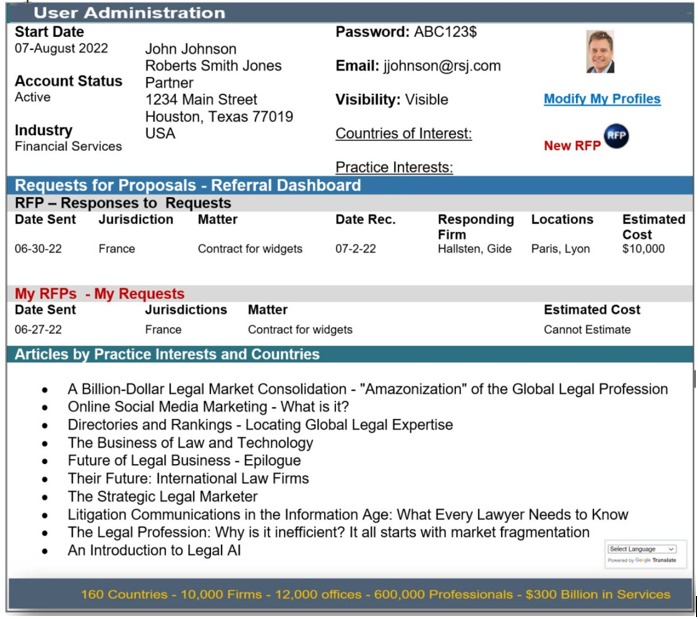Veta T. Richardson & Mary Blatch President Association of Corporate Counsel (ACC); Data Privacy and Regulatory Counsel at CFA Institute
Veta T. Richardson is
president and CEO of the Association of Corporate Counsel (ACC), the largest global bar association serving in-house
counsel. Veta’s priority as CEO involves increasing ACC’s global footprint and
charting the organization through a strategic plan geared to address the unique
needs and challenges of corporate lawyers. As a result, general counsel and
governance professionals look to the ACC for strategy, global legal trend
analysis, and research related to corporate best practices, governance
policies, advocacy, and boardroom trends. Veta was previously executive director
of the Minority Corporate Counsel Association (MCCA). She started her legal
career as in-house counsel at Sunoco, Inc., and received a B.S. and J.D. from
the University of Maryland.
Mary Blatch is Data Privacy
and Regulatory Counsel at CFA Institute. She was the Association of Corporate Counsel’s senior
director of advocacy. She directed ACC’s regulatory, legislative, and judicial
advocacy efforts on attorney-client privilege, attorney ethics and mobility,
corporate compliance, and other issues of importance to in-house counsel.
Prior to joining ACC, Mary was a senior manager at Deloitte, working on regulatory advocacy and compliance issues for the tax practice. Before joining Deloitte, she was a litigation associate at McKee Nelson LLP and Hogan & Hartson LLP (now Hogan Lovells LLP). She also served as a federal judicial clerk in the Eastern District of Virginia. Mary holds a J.D. from the Columbus School of Law at The Catholic University of America and a B.A. from Spelman College.
The only thing we have is one another. The only competitive advantage we have is the culture and values of the company. Anyone can open up a coffee store. We have no technology, we have no patent. All we have is the relationship around the values of the company and what we bring to the customer every day. And we all have to own it.The only thing we have is one another. The only competitive advantage we have is the culture and values of the company. Anyone can open up a coffee store. We have no technology, we have no patent. All we have is the relationship around the values of the company and what we bring to the customer every day. And we all have to own it.
– Howard Schultz, founding CEO, Starbucks
Introduction
When the general counsel has a seat at the chief executive’s leadership table, it sends a signal to the company’s stakeholders (internal and external) that ethics, compliance, and other legal risk considerations are a top priority of the company. A direct reporting line between the chief legal officer and chief executive officer is important to corporate culture as a reflection of the “tone at the top,” and through which the CEO sends a powerful message that business decisions are made with appropriate consideration of the ethical, legal, and reputational impacts.
There are many ways in which the board can send signals. The most powerful signals come from behaviour, language, and actions of executive directors, particularly the CEO. If the CEO is sending signals that business is a game where fouling is OK if the referee does not see you (think football), or that cutting corners is acceptable to deliver results, no amount of ‘good tone’ from the rest of the board will have much impact.[2]
As the
board meets its fiduciary duty to keep a critical eye on the company’s culture,
part of that examination must include how the general counsel functions within
the company. Through talking with well-respected general counsel and our own
research on the expectations of corporate directors and chief executives
regarding the chief legal officer, the Association of Corporate Counsel (ACC)
has developed five indicators that all directors, particularly non-executive
directors, should look to in order to assess whether a company’s general
counsel is well positioned to have a positive influence on corporate culture.
Regulatory and Business Demands Expand the Need for General Counsel Influence
In 1991, the U.S.
government issued the United States Sentencing Guidelines for Organizations,
which incentivized the creation of corporate compliance programs meant to
prevent and detect violations of the law. This began a more systematic approach
by companies to address regulatory compliance as well as ethics within their
organizations. Ultimate responsibility for a company’s regulatory compliance
usually rests with its general counsel, and as regulatory scrutiny has
increased, so has companies’ need for regulatory compliance advice.
Although some companies
have compliance functions that are separate from the legal department, many of
the activities mandated by a compliance program require legal analysis, and any
effective compliance program requires coordination with the general counsel.
The emphasis on the
general counsel’s role in ethics and compliance has made the position grow in
professional stature and influence. Regulators recognize that in-house counsel
have an essential role in promoting compliance and ethics in their companies.
They have even included in-house counsel in regulatory regimes meant to deter
corporate wrongdoing, like the Sarbanes-Oxley Act of 2002. Both directors and
general counsel are acutely aware of the importance of the general counsel role
in promoting ethics and compliance within the company. In ACC’s Skills for the 21st Century General Counsel survey, 54 percent of
directors ranked “ensuring a company’s compliance with relevant regulations” as
one of the top three ways general counsel provide value to the company. ACC’s 2017 Chief Legal Officers Survey found
that 74 percent of general counsel rated ethics and compliance as “extremely”
or “very” important over the next 12 months — the highest ranked concern in the
survey. This emphasis on the general counsel’s role in ethics and compliance
created the need for general counsel to exert greater influence within their
companies in order to fulfill the compliance mandate from regulators and the
board.
Even outside of compliance concerns, legal and regulatory issues are increasingly central to the implementation of sophisticated business strategies. For example, protecting innovation requires understanding intellectual property law; overseas expansion requires knowing the employment laws of other countries; and advances in data analytics require knowledge of data privacy laws. Where outside counsel used to be the primary legal advisers to the CEO, general counsel have come to fill that role in every corporation, particularly the large multinational and/or publicly held company. As legal departments have evolved and attracted top-level talent below the general counsel, the general counsel has carved out more time to consider strategic business issues and contribute to setting strategies. This development is a positive contribution to corporate culture.
Tone from the top is not a motivational crusade. Most changes happen where there are doubts about whether the tone is the right one. Ultimately chairmen should change the CEO if the values and ethics aren’t present to the right extent.[3]
When a general counsel is part of the executive leadership
that makes strategic business and operational decisions, those decisions are
informed by not only a legal perspective, but also by broad ethical and public
policy considerations. The general counsel is a diverse and unique voice at the
executive table. ACC’s Skills for the
21st Century General Counsel report suggests that boards are just beginning
to perceive the value of the general counsel as a strategic advisor.
Twenty-seven percent of the directors surveyed ranked the general counsel’s
“input into strategic business decisions” as a top-three value driver
currently, with 37 percent anticipating it would be a top-three value driver in
the future.
A Strong General Counsel Supports a Strong Corporate Culture
Courage is the most important attribute of a lawyer.
It is more important than competence or vision. It can never be an elective in
any law school. It can never be de-limited, dated or outworn . . .
– Robert F.
Kennedy, Speech at University of San Francisco Law School,
San
Francisco, Sept. 29, 1962
It is curious that there
has not been greater discussion of the general counsel’s role in influencing or
supporting strong corporate cultures, especially with ethics and compliance
being the primary drivers of corporate culture efforts. Of the 12 companies
that have made Ethisphere’s list of the “World’s Most Ethical Companies” each
year it has been published,[4]
ACC found that the majority of them have general counsel who are
well-positioned to influence corporate culture. For example, in 91 percent of
those companies, general counsel report to the CEO. In 83 percent, general
counsel serve as the corporate secretary, indicating direct access to the
board, and in 83 percent of those companies, general counsel are also
responsible for compliance.
The preventative role of
the general counsel and corporate legal department is key to their contribution
to regulatory compliance and corporate culture. When the general counsel is
included in discussions of business strategies before they are implemented, she
can help the company assess and avoid legal and business risks.
As preventing violations
of laws and regulations is preferable to mere detection of violations when they
occur, the general counsel has become instrumental in improving a company’s
overall compliance, as well as protecting its reputation.
Much of the general
counsel’s value when it comes to supporting a strong corporate culture stems
from the fact that the legal department’s metric for success is not the
company’s quarterly performance. The general counsel promotes ethical behavior
and integrity in corporate decisions by taking the view that short-term gain is
not worth compromising long-term sustainability. This perspective can be
important to informing what a company considers ethical. Experts consider
corporate culture to be the intangible framework meant to guide individual and
organizational behavior when there are gray areas.
With her legal background, “gray area” is a space that the general counsel regularly occupies as most laws, cases, or regulations fail to offer a “bright line” rule.
[I]t is increasingly important
that the general counsel have the skills to navigate beyond just the legal issues
— to have many more of the softer skills necessary to negotiate matters where
the rules are not always clear, where the outcomes are not always neat, and
where the impact on the overall organization is widespread and profound.
– A general
counsel who also serves as a board member,
from the Skills for the 21st Century General Counsel report
A company that leverages
its general counsel and legal department to fill in those gray areas (including
outside the legal context) in a manner that promotes ethical practices and
compliance with the law helps solidify an overall corporate culture that
emphasizes those characteristics and values. On the other hand, when the
general counsel is not empowered in such a manner, business units may fill in
those gray areas in a way that maximizes short-term returns over the
longer-term interests of the company, and compromises the ethical culture the
company wishes to build.
A strong general counsel can establish the practices that reinforce a corporate culture that values ethics and integrity. But this value can only occur if the general counsel is properly situated within the company, and the legal department has effective interactions with the company’s business units. A management team that marginalizes the general counsel and the legal department not only loses out on this risk-management perspective, but also sends a company-wide message that legal risk, ethics, and compliance are not taken seriously.
Send
lawyers, guns and money, the shit has hit the fan.
– Warren Zevon,
“Lawyers, Guns and Money” (song) (1978)
The distinction is best explained as companies with a less solid corporate ethical culture that would generally view the general counsel and members of the legal department as the group to call to “clean up” after a legal, regulatory, or compliance mess, or when a transaction goes awry. Whereas, companies with a stronger “tone at the top” corporate ethical culture look to the chief legal officer and her team as allies whom, if proactive and involved at the onset, can help prevent a mess from happening.
Five Indicators of General Counsel Influence on Corporate Culture
Accepting the proposition that a strong general counsel will have a positive effect on corporate culture, we suggest five indicators a board might consider when evaluating whether the general counsel has sufficient influence on corporate culture, and whether corporate culture itself is indeed healthy.
#1 – The general counsel reports directly to the chief executive officer and is considered part of the executive management team
C-level executives. They often
reported to the chief financial officer (CFO), chief administrative officer
(CAO), or another senior executive. As regulatory and business demands spurred
the changes in the legal department detailed above, the role and relative
authority of the general counsel increased. Per the ACC Chief Legal Officers 2017 Survey, 72 percent of respondents report
directly to the CEO.
While this number has
increased – only 64 percent of general counsel reported to the CEO in ACC’s 2004 Chief Legal Officers Survey — the
movement of less than 10 percentage points is a concern given how much more
global and complex the challenges businesses face have become.
The reporting structure of
the general counsel position is an important indicator of the influence that
the legal department has in the company. The ACC Chief Legal Officers 2017 Survey
showed that general counsel who report to the CEO were much more likely to say
that the executive team “almost always” seeks their input on business
decisions.
General counsel who report
to the CEO were also significantly more likely to report they “almost always”
contribute to strategic planning efforts compared with those who don’t. When
the general counsel is consulted about business decisions and strategic
planning efforts, there is a greater likelihood that those decisions and plans
will take into account legal and regulatory risks. Pre-decision consultation
helps the legal department fulfill its preventative role within the company.
In addition to providing the legal department with requisite influence, having the general counsel report to the CEO is an important part of setting the “tone at the top.” When legal has a seat at the table, it sends a message to the rest of the company that compliance with laws and regulations is a company priority. It also says something about the CEO: that input from legal is valued, and that the CEO’s vision for the company prioritizes ethics and integrity.
#2 – The general counsel has regular contact with the board of directors
A board of directors that
does not have a consistent relationship with the company’s general counsel
should be a cultural red flag and prompt further board inquiry. While the
relationship between the general counsel and the board can take various forms,
it is important that the relationship at least be consistent. After all, the
board is the company’s fiduciary representative, and the company is the general
counsel’s client (not members of the executive management team). A relationship
between the general counsel and the board of directors enables the board to set
the right tone for the company’s legal, ethical, and compliance culture, and
also helps maintain the independence of the legal function.
Our data indicate that
there is room for improvement in the relationship between boards and general
counsel. In the ACC Chief Legal Officers
2017 Survey, 18 percent of respondents reported having a “direct” reporting
relationship with the board of directors, and 67 percent reported that they
“almost always” attend board meetings. However, a full 21 percent report that
they seldom or never attend board meetings. While not every company requires a
direct reporting structure between the general counsel and the board, at a
minimum, the general counsel must have a mechanism to bring controversial
issues to the board — without prior CEO consent.
In addition
to raising issues directly with the board, an influential general counsel can
be an ally in the board’s efforts to set the tone for the company’s compliance
culture. The ACC survey shows that similar to the effect of direct CEO
reporting by the general counsel, a board relationship imbues the general
counsel with more influence over business decisions. General counsel who had a
reporting relationship to the board were significantly more likely to be asked
for input on business decisions; they were also significantly more likely to
contribute to the company’s strategic planning.
A relationship with the board also helps preserve the independence of the legal department. Much has been made of the independence, or lack thereof, of in-house counsel, because they depend on management for employment and compensation decisions. The board can serve as an important check on the potential conflict the general counsel might feel between her service to executive management, and her duty to the company as a client. Moreover, if a general counsel needs to report concerns to the board, finding a way to do so without formal access or a prior relationship with the board creates an obstacle to fulfilling her ethical duties. Ultimately, this leaves the board of directors unaware, and potentially exposed, to legal or compliance risks that require their attention.
#3 - The general counsel is viewed as independent from the management team
The first two indicators state that general counsel should have a seat at the management table and a relationship with the board. If the general counsel fails to maintain her independence, neither of those relationships will benefit the company the way they should. The value the general counsel brings to the table is compromised if she is seen as lacking the courage to challenge management decisions when necessary. While general counsel are a part of the executive team, they must maintain a delicate balance between that position and their duties to the company as their client. Further, the board needs to satisfy itself that the general counsel is achieving that balance in order to have a healthy corporate culture.
As a board member, it’s
important to me that the GC understands that their obligation is to the company
and not really to the CEO [who] hires them.
– From the Skills for the 21st Century General Counsel report
As mentioned above, the
company is the general counsel’s client, and if the general counsel is overly
beholden to management, the result may be advice and counsel that does not
prioritize what’s best for the company.
Additionally, if such a perception is widely held throughout the company, it can erode the confidence that lower level employees place in the legal department. The general counsel should be seen as the senior executive most capable of pushing back on management decisions that put the company at legal or reputational risk. There must be a willingness by the general counsel to raise issues with the board, even if doing so may threaten her own standing with the CEO and other executives.
#4 – The general counsel is expected to advise on issues that extend beyond the traditional legal realm, including ethics, reputation management, and public policy
As a director, my experience is
that boards look to the general counsel to give them perspective on not just
the problems that present themselves … but also for guidance on things the
board should be thinking about, and how particular issues fit into the overall
context of the business.
– From the Skills for the 21st Century General Counsel report
If the
general counsel is to manage risk and support an ethical corporate culture, she
must be empowered to advise on issues beyond traditional legal matters. In
addition to rapid changes in the legal and regulatory landscape, companies are
navigating issues involving public policy, politics, the media, and social
pressure from consumers. The increasing importance of these “business in
society” issues means they can pose formidable risks to companies. Someone
needs to have official responsibility for these matters and the general counsel
is well suited for this task. Effective lawyering has always left room for
evaluation of non-legal considerations. With the intense scrutiny that
companies face in today’s world, it is important to consider how conduct that
is technically legal can still be damaging to the company’s reputation,
community goodwill, or its relationships with stakeholders. Corporate decisions
in these areas need to be evaluated against a company’s risk appetite, integrity,
and values.
Indeed,
there is a trend toward consolidating control of some of the corporate
functions that address these legal-adjacent issues within the legal department.
For example, the ACC Law Department
Management 2016 Report showed that the legal department often oversees the
government affairs function (44 percent); security (23 percent); public policy
(21 percent); and communications (19 percent).
Even if the general counsel is not directly responsible for these matters, management should proactively seek the advice of the chief legal officer on these issues. The legal department cannot be left out of the decision-making on such matters if an ethical culture is to thrive.
#5 – Business units regularly include the legal department in decision-making
If the CEO’s and board’s
relationships with the general counsel set the cultural tone at the top, then
the interaction between business units and the rest of the legal department
create the mood in the middle. Companies must develop a culture where in-house
counsel are regularly consulted in decision-making at levels below the general
counsel. This ensures that legal and risk considerations are taken into account
as new products, services, or business practices are developed.
Inclusion of the legal
department in the decision-making process is especially essential as businesses
expand into areas where the law is uncertain. It is those gray areas where
legal counsel can be most helpful in guiding the company in a manner that
follows its corporate ethical compass. Having counsel involved on the frontend
of decisions is the difference between having a legal department that is
engaged, involved, and actively preventative from a compliance standpoint, and
one that just plays clean up after something goes wrong. Greater interaction
between the business and legal teams also reinforces the idea that risk
management is everyone’s responsibility. In today’s hyper-regulatory business
environment, ignorance of the law will not shield an executive from indictment.
The interaction between a business and its attorneys will look different across
companies, but from the board’s perspective, if such interaction is not
occurring, that might be a sign that corporate culture is underemphasizing
legal and compliance risk.
The need for communication
and collaboration with other functions is not limited to outward-facing
business units — the internal-facing business units should also have
established relationships with the legal department. Data security, for
example, involves the law department and IT; the human resources department
should provide information to support legal conclusions on employment matters;
lawyers should be involved with the government affairs team to help define
regulatory and legislative goals. In fact, because the legal department is so
integral to the operations of a company, its reach can be a good proxy by which
to measure communication and effective risk management across functions. If the
board cannot find evidence of such collaboration, it could indicate a “siloed”
corporate culture that exposes the company to unnecessary risks.
One important caveat to the above: However a company determines to facilitate the legal department’s involvement in decisions, it should not be done in a way that negates individual lawyers’ accountability to the general counsel. Several of the notable corporate scandals have been blamed, in part, on a lack of accountability between the general counsel and the line attorneys who had often seen signs of questionable corporate conduct. In other words, the attorneys who reported directly to business leaders were less effective in elevating issues of concern to the appropriate levels within the company. There should be general counsel oversight — perhaps a dotted-line reporting structure — over lawyers assigned to the business units to ensure proper reporting of issues of concern.
Conclusion
The five indicators below offer a checklist of current best practices of companies with strong general counsel and reputations for high integrity and ethics. These indicators can also be used as litmus tests of corporate culture. Given the incredible transformation of the corporate legal department over the last few decades, ACC believes we are just beginning to see the positive effects that a well-positioned general counsel and strong legal department can have on corporate culture.
❏ #1
– The general counsel reports directly to the chief executive officer and is
considered part of the executive management team
❏ #2 – The general counsel has regular
contact with the board of directors
❏ #3
– The general counsel is viewed as independent from the management team
❏ #4
– The general counsel is expected to advise on issues that extend beyond the
traditional legal realm, including ethics, reputation management, and public
policy
❏ #5 – Business units regularly
include the legal department in decision-making





 Software
Software Law
Law Legal
Legal






